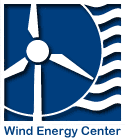Abstract:
Floating wind energy technology is immature but is developing quickly with the promise to provide a significant portion of global energy needs. To realize this potential, floating turbines need to lower their costs and increase their manufacturability. Prof. Myers and his colleague Jim Papadopoulos have redesigned the wind turbine to optimize it for ocean use. The system is expressly designed for low-cost, high-volume manufacturing, and broad deployment, with reduced requirements for fabrication capability, supply chain complexity, special vessels, and port infrastructure. Unlike conventional designs, the system allows two kinds of motion in the water: (1) weather-vaning to align with the wind and permit a more efficient tower and (2) significant wave-induced pitch and heave, so a lighter, shallower-draft platform can be employed. The resulting system yaws about a single-point mooring, directs the sloped mooring force to the hub to eliminate pitch from wind thrust, uses an assemblage of two upwind and two downwind legs to support a nacelle and rotor from both sides and mate to widely spaced floats (providing large resistance to overturning), and can be launched, towed, and installed in shallow or deep water. Preliminary results on the motions of this system under regular and irregular wave loading will be presented based on simulations and wave tank testing of a 1:60-scale prototype.
Bio
Andrew T. Myers, P.E., Ph.D., is an Associate Professor and Associate Chair of Civil and Environmental Engineering at Northeastern University and a registered professional engineer in the state of California. Prior to joining Northeastern, Andrew worked for two years at AIR Worldwide in San Francisco, where he consulted on site-specific natural catastrophe risk assessments. He received his M.S. (2006) and Ph.D. (2009) at Stanford University and his B.S. (2004) from Johns Hopkins University; all three degrees are in Civil and Environmental Engineering with a focus on Structural Engineering. He was awarded the 2016 CAREER award from the National Science Foundation for his work on offshore hazard modeling. He is an expert in offshore wind development, serving as co-founder of the Partnership for Offshore Wind Energy Research (POWER-US) and lead technical organizer of the 2019 French-US Floating Wind Energy Technology Workshop. His research interests include wind energy structures, multi-scale experimental testing of structures, and probabilistic modeling of structural and natural systems.

